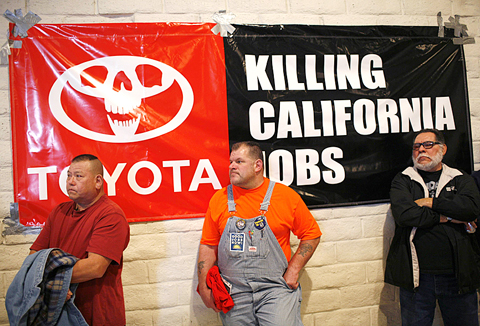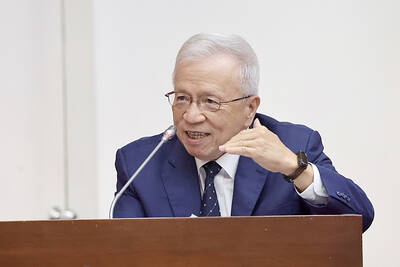Toyota Motor Corp will recall 8,000 pickups due to possible cracks in a common drive shaft component that Ford Motor Co and Nissan Motor Co Ltd said posed no safety risk to their vehicles.
Toyota’s decision to recall the this year’s model Tacoma pickup trucks in the US, which it announced on Friday, was the latest in a series of recalls that have hurt the automaker’s sales and its reputation for quality.
The Toyota recall followed supplier Dana Holding Corp’s report to US safety regulators that 34,000 drive shaft components it supplied to Toyota, Ford and Nissan could have cracks.

PHOTO: REUTERS
Dana said it was investigating the cause of the problem and remedies would be specific to each vehicle on which the parts are used. It believed less than 2 percent of the parts shipped to the automakers had cracks.
About 17,000 of the parts were supplied to Ford Escape and Mercury Mariner car-based SUVs and a review found no potential impact on the vehicles, Ford spokesman Said Deep said.
“Our rigorous testing and review concluded there are no safety or performance issues,” Deep said.
The parts were supplied for a small number of this year’s model four-wheel drive Nissan and Infiniti trucks and SUVs, Nissan said.
The vehicles “will not experience a loss of control or present a safety risk even in the unlikely event the part should fail,” Nissan spokesman Colin Price said in a statement.
Toyota said in a document obtained by reporters that the all-wheel drive version of the 2010 Tacoma trucks might have a component containing cracks in the joint portion of the drive shaft due to an “improper manufacturing process control.”
The cracks eventually could cause the drive shaft to separate and strike the road surface, potentially causing drivers to lose control of the vehicle, the document showed.
Toyota said in the document the pickups were built from mid-December to early this month.
It told the US National Highway Traffic Safety Administration of its planned recall on Thursday and was not aware of any accidents caused by the defect.
Toyota’s latest move follows a string of recalls in recent months that cover more than 8.5 million vehicles globally due to the risk that a loose floormat or a sticky accelerator pedal may lead to unintended acceleration, and to resolve a problem with regenerative braking on its Prius hybrid car.
VOLKSWAGEN
Meanwhile, German automaker Volkswagen said on Friday it was recalling some 20,000 cars in Mexico, a day after it announced the recall of nearly 200,000 cars in Brazil over potential wheel malfunctions.
The company said the recall in Mexico had been ordered over the “possibility that the rear wheel bearings could be insufficiently lubricated, causing then to make noise.”
“If the situation is not addressed, it could cause the wheel bearings to lock,” the company said in a statement released by its Puebla factory.
The company said it was recalling “approximately 20,000 cars,” all of them Gol and Gol Sedan models, the statement said.
A day earlier, the company said it was recalling nearly 200,000 of its Novo Gol and Voyage model cars in Brazil over the same issue.
Volkswagen Brazil said on its Web site that 193,620 Novo Gol and Voyage cars were at risk of not having sufficient lubrication on its rear wheels, which “can cause noise and continuous use could lead to a blockage of the wheels.”
“In extreme cases, the wheel can come off,” it said.
Volkswagen also said on Friday that its global sales were up more than 40 percent on the year last month, powered by strong demand in China.

JITTERS: Nexperia has a 20 percent market share for chips powering simpler features such as window controls, and changing supply chains could take years European carmakers are looking into ways to scratch components made with parts from China, spooked by deepening geopolitical spats playing out through chipmaker Nexperia BV and Beijing’s export controls on rare earths. To protect operations from trade ructions, several automakers are pushing major suppliers to find permanent alternatives to Chinese semiconductors, people familiar with the matter said. The industry is considering broader changes to its supply chain to adapt to shifting geopolitics, Europe’s main suppliers lobby CLEPA head Matthias Zink said. “We had some indications already — questions like: ‘How can you supply me without this dependency on China?’” Zink, who also

At least US$50 million for the freedom of an Emirati sheikh: That is the king’s ransom paid two weeks ago to militants linked to al-Qaeda who are pushing to topple the Malian government and impose Islamic law. Alongside a crippling fuel blockade, the Group for the Support of Islam and Muslims (JNIM) has made kidnapping wealthy foreigners for a ransom a pillar of its strategy of “economic jihad.” Its goal: Oust the junta, which has struggled to contain Mali’s decade-long insurgency since taking power following back-to-back coups in 2020 and 2021, by scaring away investors and paralyzing the west African country’s economy.

BUST FEARS: While a KMT legislator asked if an AI bubble could affect Taiwan, the DGBAS minister said the sector appears on track to continue growing The local property market has cooled down moderately following a series of credit control measures designed to contain speculation, the central bank said yesterday, while remaining tight-lipped about potential rule relaxations. Lawmakers in a meeting of the legislature’s Finance Committee voiced concerns to central bank officials that the credit control measures have adversely affected the government’s tax income and small and medium-sized property developers, with limited positive effects. Housing prices have been climbing since 2016, even when the central bank imposed its first set of control measures in 2020, Chinese Nationalist Party (KMT) Legislator Lo Ting-wei (羅廷瑋) said. “Since the second half of

AI BOOST: Next year, the cloud and networking product business is expected to remain a key revenue pillar for the company, Hon Hai chairman Young Liu said Manufacturing giant Hon Hai Precision Industry Co (鴻海精密) yesterday posted its best third-quarter profit in the company’s history, backed by strong demand for artificial intelligence (AI) servers. Net profit expanded 17 percent annually to NT$57.67 billion (US$1.86 billion) from NT$44.36 billion, the company said. On a quarterly basis, net profit soared 30 percent from NT$44.36 billion, it said. Hon Hai, which is Apple Inc’s primary iPhone assembler and makes servers powered by Nvidia Corp’s AI accelerators, said earnings per share expanded to NT$4.15 from NT$3.55 a year earlier and NT$3.19 in the second quarter. Gross margin improved to 6.35 percent,